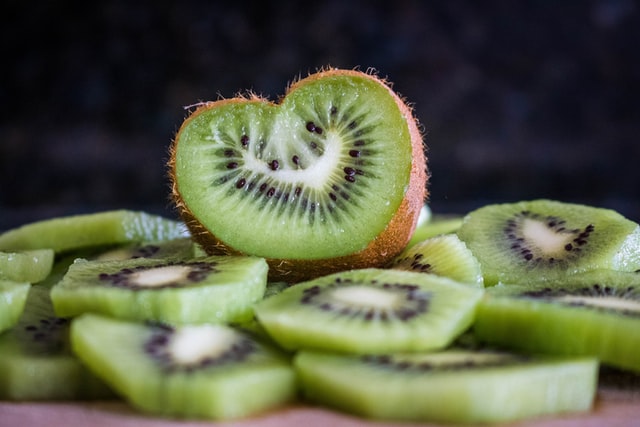Kiwi is a little fruit with a lot of nutritional value. Kiwifruit, also known as Chinese gooseberries, originated in China before moving to New Zealand, Europe, and the United States.Unfortunately, for some people, kiwis can cause a fruit allergy. However, for most people who aren’t allergic, kiwis are a tasty way to supplement their diet with vitamins, minerals, and fiber.

Minerals and Vitamins
Two kiwis provide 230 percent of your daily vitamin C needs and 70 percent of your daily vitamin K needs. Kiwi fruits are also high in potassium, vitamin E, and folate.
Kiwis are high in complex carbs and fiber, as well as antioxidants. Kiwis also provide more vitamin C than you need and plenty of vitamin K.
Advantages to Health
In terms of health, there isn’t anything to hate about kiwis. On the contrary, kiwis have many health benefits due to their high antioxidant and fiber content.
Aid Iron Deficiency Prevention Anemia
Although kiwi is not a high source of iron, it is one of the best natural sources of vitamin C. Vitamin C enhances iron absorption substantially, thus preventing iron deficiency. Therefore, it is better to consume your iron-fortified breakfast cereal with two kiwis with a banana to receive higher blood ferritin levels if you are anemic.

May Reduce Cold Symptoms’ Duration
According to a study of healthy older persons, kiwis can help reduce the duration and severity of upper respiratory illnesses such as the common cold. Participants who consumed four gold kiwis per day experienced less acute congestion and painful throat pain associated with respiratory diseases. In addition, symptoms resolved faster in the Kiwi group than in the control group.
Helps with Heart Health
Kiwis are low in sodium and high in potassium. This is a winning electrolyte combination for lowering blood pressure. Kiwis (and other fruits and vegetables) contain folate, which has been linked to a lower risk of stroke. Furthermore, the fiber component of kiwis aids in cholesterol reduction. Therefore, include kiwis in your diet, especially in substitution of salty processed foods, to preserve your cardiovascular system.
Beneficial for Digestive Health
Consuming kiwis on their own or with meals promotes digestive health in a variety of ways. Kiwis are high in soluble and insoluble fiber, both of which are necessary for regularity (two green kiwis provide 4 grams of fiber). Dietary fiber improves waste transit time, increases stool size, and promotes healthy gut bacteria that facilitate digestion. Kiwis contain the enzyme actinidin as well. Actinidin speeds up protein digestion in the stomach and small intestine. Kiwis are a low-FODMAP food, which means they are low in fruit sugars, which can cause symptoms in people with IBS.

Wound Healing
Vitamin C and vitamin K are the most abundant micronutrients in kiwis, and both are essential for wound healing. Vitamin C acts as a precursor to collagen, which is a structural component of your skin. It’s also a powerful antioxidant, assisting the body’s natural repair mechanisms. Vitamin K promotes timely blood clotting, which helps prevent excessive bleeding. Vitamin K has also been connected to increased bone strength and the prevention of fractures.
Allergies
Along with peaches and apples, kiwi is a common fruit allergy. Also, Kiwi allergies are sometimes linked to pollen, latex, or other fruits.
Skin rashes and swelling and itching of the tongue, lips, and throat are common mild symptoms. More serious kiwi allergies can cause heart palpitations or anaphylaxis. If you feel you are allergic to kiwi, consult an allergist for testing.

Negative Consequences
Kiwis are rich in vitamin K. Vitamin K aids in blood coagulation and may interact with blood thinners. Therefore, Coumadin (warfarin) users should consume vitamin K-rich meals on a regular basis. This ensures that the pharmaceutical dosage advised to you will be effective.
Varieties
Several kiwi types are endemic to China and Taiwan. Commercial kiwi cultivation is also practiced in California and New Zealand. Actinidia deliciosa, golden kiwi (A. Chinensis), red kiwi (A. melanandra), silver vine (A. polygama), purple kiwi (A. purpurea), and Actinidia arguta, Actinidia kolomikta, and Actinidia coriacea or Chinese egg gooseberry are some common types. Because golden kiwis have no hair, some people consume the skin, which offers fiber. Golden kiwis also have a higher vitamin C content than green kiwis.

When It Is Ripe
Kiwi is in season from November to May but may be purchased in most stores all year. When kiwis are fully ripe, they press softly, smell fragrant, and appear plump. You can buy firm, unripe kiwis and ripen them at room temperature at home for a few days. Overripe kiwis with soft areas, bruising, or wrinkles are best avoided. Food Safety and
Storage and Preparing
Kiwis can be stored in the refrigerator for 7 days once ripe. Refrigerating them in a plastic bag reduces moisture loss, allowing them to last for up to two weeks. 9 Before slicing or eating kiwis, rinse them under running water. Kiwis, including the seeds and skin, are totally edible; nevertheless, many people prefer peeling them. Kiwis are best eaten uncooked or in a fruit salad. Their rich hue enlivens dishes and makes an eye-catching garnish or topping. Kiwis can be used in smoothies, sauces, and mousses. In addition, Kiwi contains actinidin, which is a natural meat tenderizer, making kiwis an excellent addition in marinades.
Kim’s Final Thoughts…
Kiwi’s are on one my favorite fruits and I would definitely recommend having them on your weekly grocery list. Kiwis are packed with a wealth of nutrients, including a selection of essential vitamins, minerals, and fiber. They have an especially high vitamin C content, which is an important ingredient for maintaining a healthy immune system. Most importantly, they’re delicious!

